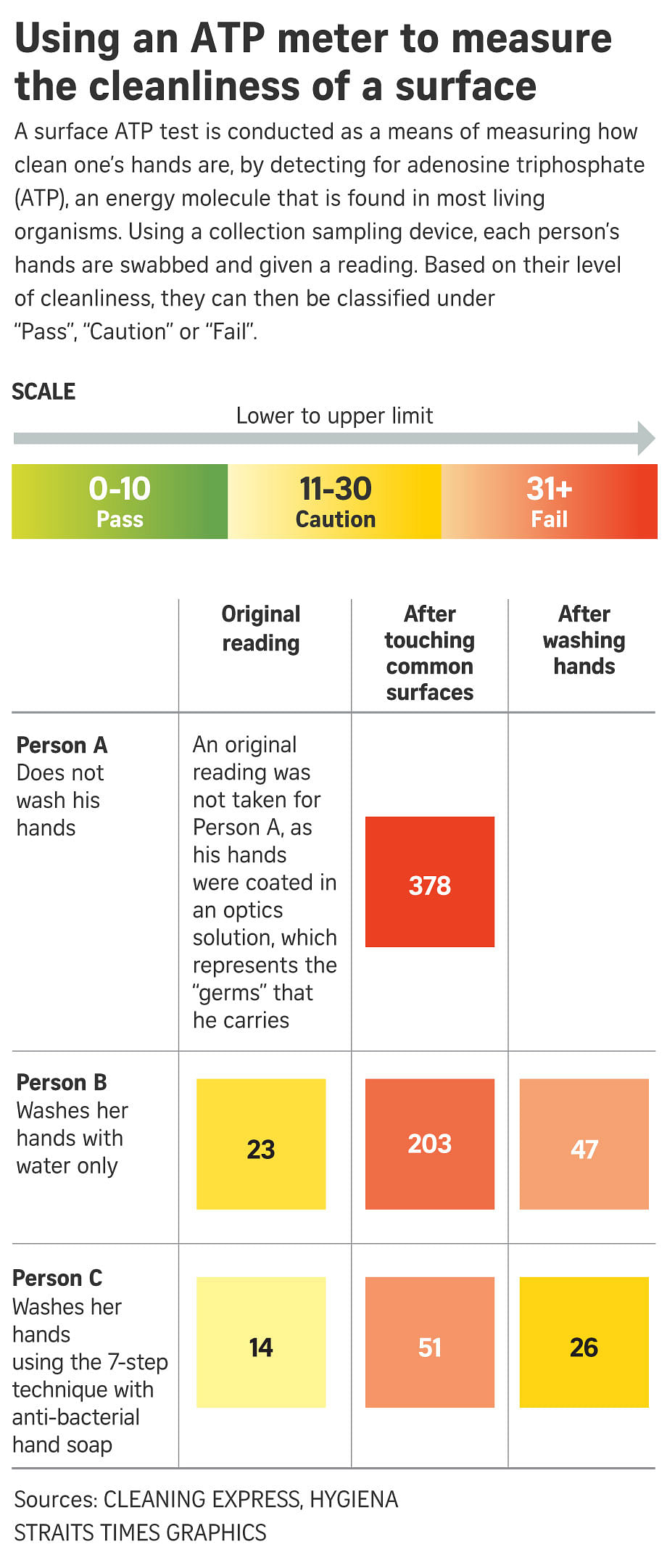Why washing hands with soap is critical in battling Covid-19
Water alone doesn't help remove germs but thorough cleansing does, experiment shows
Sign up now: Get ST's newsletters delivered to your inbox
Masks are now a must for anyone stepping out, and safe distancing measures are in full throttle, but washing your hands properly remains a cornerstone of the battle against the coronavirus.
An experiment conducted by The Straits Times has shown that doing this thoroughly with soap makes a critical difference. It can reduce the amount of germs picked up on the hands by 45 per cent compared with rinsing them with just water.
Even as the multi-ministry task force tackling Covid-19 announced yesterday that masks are compulsory for those leaving home, Health Minister Gan Kim Yong stressed the importance of personal hygiene, particularly during the current period of enhanced safe distancing.
"I would continue to encourage Singaporeans to wash your hands, observe personal hygiene, which is a very critical factor in disrupting the transmission chain," he said.
An effective way to wash hands involves a seven-step process that ensures a thorough cleansing as it covers the base of one's palms to the tip of the fingers - all of which should take approximately the time needed to sing Happy Birthday twice.
ST worked with professional cleaning company Cleaning Express to see how easily germs can get on hands after touching common surfaces, and how thorough hand washing may help to dispel these germs, which include bacteria and viruses, among them Covid-19.
The experiment, conducted using common touch-points like computers, door handles and light switches, involved three people, an optics solution as a stand-in for the germs on a surface, and an ATP meter to measure the cleanliness of a surface.
The device detects biological contamination by measuring adenosine triphosphate (ATP), the molecule found in cells. While it does not specifically indicate the presence of viruses, it highlights where they may lurk.
The optics solution is typically used in hygiene training to demonstrate correct hand-washing techniques. Under UV light, darkened parts show unwashed areas, signalling this was not done correctly.
Microbes such as the coronavirus can stay on some surfaces for days and be transferred on to each subsequent person touching the same lift button or ATM, for instance.
In the experiment, the first person touched various surfaces with unwashed hands. Two others then touched the same items.
Afterwards, one rinsed her hands with water, while the other used soap. Typically, a reading above 31 signals a "fail" as the surface is dirty, and a reading between 11 and 30 suggests a surface is generally clean, though not microbe-free. A reading below 10 signals that the surface is very clean and is considered a "pass".
The results were telling: Using water alone gave a cleanliness reading of 47 - the person's hands remained dirty, and the UV light highlighted visible stains.
The person who used soap, in contrast, received a score of 26, which is considered generally clean, and her hands were stain-free. But her hands were still not 100 per cent germ-free.
Infectious diseases expert Leong Hoe Nam explained that to kill all the microbes on one's hands, skin disinfectants containing chlorhexidine-or iodine-based agents - the kind used by doctors before surgery - have to be used.
He added that to maintain one's hygiene amid the Covid-19 pandemic, however, washing hands thoroughly with soap and water would be sufficient, and suggested that antibacterial soap has an added advantage.
"As viruses require physical flushing and soap detergent to break its structure, regular soap will suffice - as long as we practise the seven-step hand-washing process," he said.



